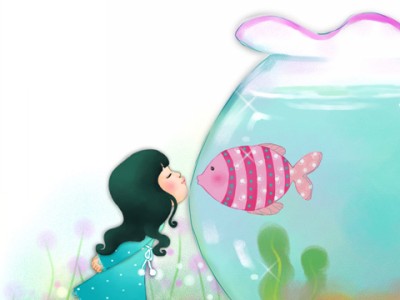(单词翻译:单击)
英文原文
【背景介绍】
鱼没有突起的鼻子,但有鼻腔,有嗅觉细胞。鱼的鼻子不用于呼吸,水从鼻孔流出来,是为了能嗅到水中的气味。
【英文原文】
Can Fish Smell?
Y: I noticed that fish have holes that look like nostrils, does that mean they can smell?
D: Smell, or olfaction, as scientists call it, is an important sense for many fish. Those little holes that look like nostrils are called nares. Nares don’t lead to the throat the way nostrils do in mammals, but open up into a chamber lined with sensory pads.
Not all fish move water in and out through these nares in quite the same ways, but key to a strong sense of smell for fish is the ability to move water rapidly over these sensory pads.Some fish can pick up chemical signals when immobile by pumping water through their olfactory system via tiny hairs called cilia.
Other fish can pump water by a muscular movement. Some fish, such as smaller species of mackerel, have an olfactory system that requires them to swim in order to get water moving through their nares.When the sensory pads pick up chemical signals, they transmit them to the fish’s forebrain, which interprets the signal and incites the fish to respond appropriately.
Y: You mean like if the chemical signal food, the fish will pursue the food. Or, if the chemical signal danger, they will flee?
D: You got it. But fish use chemical cues in all sorts of ways. For instance, a large group of fishes release a chemical when they’re wounded that incites other fish to flee. And then there are salmon, which are known for a superb sense of smell that enables them to sense the stream where they were born, so that they may return to it to spawn.
参考翻译
【参考翻译】
鱼有嗅觉吗?
Y:我发现鱼身上有2个像鼻孔一样的小洞,他们有嗅觉吗?
D:闻,或则科学家们所说的嗅觉,是鱼类的一种重要感官。那些看上去像鼻孔一样的小洞,就是鱼的鼻孔。它们不像其他哺乳动物的鼻孔一样,直接通往喉咙,而是与它们的感觉板连到了一起。并不是所有的鱼在水里都是那样通过鼻子呼气,忽上忽下的来游,但是这些感官可以帮助鱼类很快地在水中穿梭。当鱼类停止游动的时候,它们可以通过用自己的纤毛排水,来感觉身边的化学信号。其他的鱼可以通过肌肉的运动来排水。还有一些小鱼,例如鲭,有一个嗅觉系统,它们需要游泳使鼻孔中的水流动,当感官系统接收到化学信号的时候,它们会将这个传送到自己的前脑,从而获得信息,作出相应的反应。
Y:你的意思是说,如果它们接受到食物的信号,它们就会去追捕,还是说如果它们碰到危险,就会赶紧逃跑?
D:说对了,不过鱼可以通过各种方法来使用这些化学信号。例如,如果一群鱼受到攻击,它们就会释放出一种化学物质,好让其它的鱼赶紧逃命。还有一种鱼,叫大马哈鱼,它们就是因为自己的超强的嗅觉而闻名的,它们识别自己出生的河流,从而到那边去产卵。
重点词汇
【重点词汇】
1.Smell, or olfaction, as scientists call it, is an important sense for many fish.
闻,或则科学家们所说的嗅觉,是鱼类的一种重要感官。
olfaction n. 嗅觉
2.Some fish can pick up chemical signals when immobile by pumping water through their olfactory system via tiny hairs called cilia.
当鱼类停止游动的时候,它们可以通过用自己的纤毛排水,来感觉身边的化学信号。
immobile adj. 不动的,不变的,静止的
如:The deer stood immobile among the trees.
那只鹿一动不动地站在树丛里。
Her illness has made her completely immobile.
她病得完全失去了活动能力。
3.For instance, a large group of fishes release a chemical when they’re wounded that incites other fish to flee.
例如,如果一群鱼受到攻击,它们就会释放出一种化学物质,好让其它的鱼赶紧逃命。
incite v. 煽动,刺激,激励
如:Just a few words will incite him into action.
他只需几句话一将,就会干。
The captain was accused of inciting other officers to mutiny.
该上尉被控煽动军官叛变。



